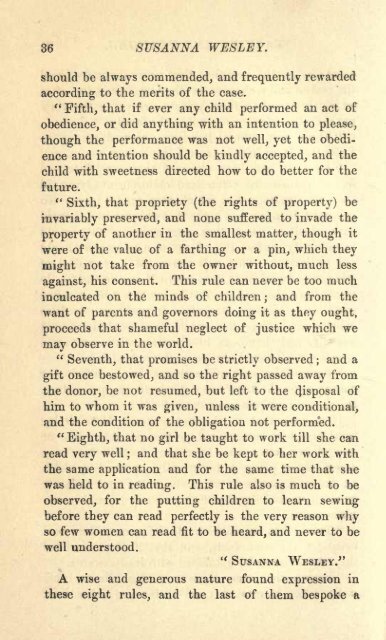Susanna Wesley
This is the story of Susanna Wesley, 1669-1742 Mother of Charles and John Wesley, who were founders of the Methodist Church. Susanna and her husband, Samuel, had nineteen children, ten of whom survived to adulthood. Her son Charles became a well-known hymn writer and her son John became the found of Methodism. Susanna was brought up in a Puritan home as the youngest of twenty-five children. As a teenager, she became a member of the Church of England. She became the wife of a chronically debt-ridden parish rector in an English village. She said, "I have had a large experience of what the world calls adverse fortune." Nonetheless, Susanna managed to pass down to her children Christian principles that stayed with them.
This is the story of Susanna Wesley, 1669-1742 Mother of Charles and John Wesley, who were founders of the Methodist Church. Susanna and her husband, Samuel, had nineteen children, ten of whom survived to adulthood. Her son Charles became a well-known hymn writer and her son John became the found of Methodism.
Susanna was brought up in a Puritan home as the youngest of twenty-five children. As a teenager, she became a member of the Church of England. She became the wife of a chronically debt-ridden parish rector in an English village. She said, "I have had a large experience of what the world calls adverse fortune." Nonetheless, Susanna managed to pass down to her children Christian principles that stayed with them.
You also want an ePaper? Increase the reach of your titles
YUMPU automatically turns print PDFs into web optimized ePapers that Google loves.
36 SUSANNA WESLEY.<br />
should be always commended, and frequently rewarded<br />
according to the merits of the case.<br />
" Fifth, that if ever any child performed an act of<br />
obedience, or did anything with an intention to please,<br />
though the performance was not well, yet the obedience<br />
and intention should be kindly accepted, and the<br />
child with sweetness directed how to do better for the<br />
future.<br />
" Sixth, that propriety (the rights of property) be<br />
invariably preserved, and none suffered to invade the<br />
property of another in the smallest matter, though it<br />
were of the value of a farthing or a pin, which they<br />
might not take from the owner without, much less<br />
against, his consent. This rule can never be too much<br />
inculcated on the minds of children; and from the<br />
want of parents and governors doing<br />
it as they ought,<br />
proceeds that shameful neglect of justice which we<br />
observe in the world.<br />
may<br />
" Seventh, that promises be strictly observed and a<br />
;<br />
gift once bestowed, and so the right passed away from<br />
the donor, be not resumed, but left to the disposal of<br />
him to whom it was given, unless it were conditional,<br />
and the condition of the obligation not performed.<br />
" Eighth, that no girl be taught to work till she can<br />
read very well ;<br />
and that she be kept to her work with<br />
the same application and for the same time that she<br />
was held to in reading. This rule also is much to be<br />
observed, for the putting children to learn sewing<br />
before they can read perfectly is the very reason why<br />
so few women can read fit to be heard, and never to be<br />
well understood.<br />
" SUSANNA WESLEY."<br />
A wise and generous nature found expression in<br />
these eight rules, and the last of them bespoke a


















